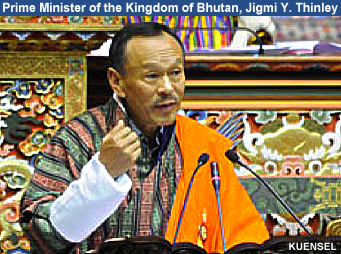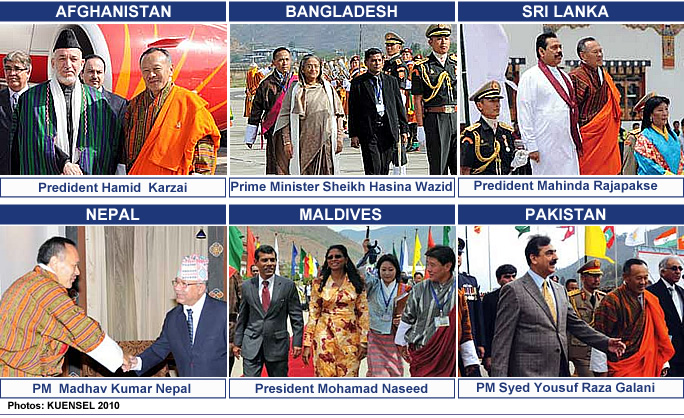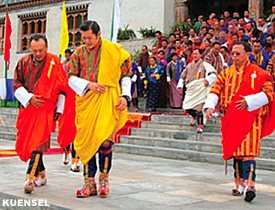| You are here: | RAO Home > Bhutan > Topics > Politics > Prime Minister > Jigmi Y. Thinley | Search |
 |
| Bhutan - Politics |
| Prime Minister |
|
 |
|
|
| Prime Minister of the Kingdom of Bhutan |
| PM Jigmi Y. Thinley |
On April 9, 2008, the fourth day of the third month of the male earth rat year, Jigmi Yoezer Thinley took his place on the highest seat of governance that a Bhutanese citizen can aspire for.
 |
|
The prime minister was then escorted to the newly established office at Gyalyong Tshogkhang in a chipdrel procession and presented a guard of honour by the Royal Bhutan Police.
The Dorji Lopon of the Zhung Dratshang presided over a special tendryil ceremony inside the prime minister's office and offered the Tashi Zegye (offering of the eight auspicious objects). Government officials and people's representatives of Thimphu offered the ku-sung-thugten mendrel to the prime minister.
Thousands of well wishers, who offered khadar and tashi delek to the prime minister, said they were extremely moved by the historic occasion. "It demonstrates the trust and confidence of the people in the new democratically elected government established by our Kings," said a Thimphu businessman.
"It's a privilege to be part of history," said a civil servant. A local leader said that he had come to offer his prayers that the prime minister would fulfill His Majesty's vision of serving the people through a democratically elected government.
Meanwhile, the establishment of the government was completed yesterday with the announcement of portfolios of 10 cabinet ministers, who also received dakyens from His Majesty the King. The party won 45 of the 47 seats to the National Assembly in the March 24 general elections.
Lyonchhen Jigmi Thinley (Dasho), who has been emphasizing responsibility rather than celebrations on the party's victory, said that his government would adopt the Constitution of Bhutan and then discuss the 10th five-year plan. He said that DPT would continue as a party, with party activities. "We'll build our base in the constituencies and the party members will be active in their constituencies," he told Kuensel, adding that members of parliament would be required to visit their constituencies at least twice a year.
Born in 1952 in Bumthang, the prime minister comes from Mendrelgang, Punakha and transferred his census to Pemagatshel. He began his academic career in Dr Graham's Homes in Kalimpong and graduated from St Stephen's College in India. He completed his master's in public administration from Penn State university in the United States and a certificate course in manpower planning and management from Manchester university, United Kingdom.
He joined the civil service in 1974 and served in various capacities for 34 years.
When the national administration was decentralised into the zonal system on trial, he became the zonal administrator of the Eastern Zone, in 1990.
In 1992, he became secretary in the home ministry and in 1994 was promoted as deputy minister in the same ministry.
1992, he was appointed as permanent representative of the Kingdom of Bhutan to the United Nations office and other international organizations in Geneva.
He received the Red Scarf and the title Dasho in February 1987 and was awarded the Orange Scarf and rank of Deputy Minister in January, 1994.
He served as minister for foreign affairs and home minister and two terms as prime minister in 1998 and 2003.
He was conferred the Druk Thuksey and Coronation medals on June 2, 1999.
| Contributed by Rinzin Wangchuk, KUENSEL, Bhutan's National Newspaper, April 2008 |
|
|
| Jigmi Y Thinley welcomes SAARC-leaders |

|
| 16th SAARC Summit 2010 - Bhutan |
| Master Politician: Jigmi Y Thinley |

|
|
Though he is not especially funny, he likes to begin his stump speech with a joke. "You must be wondering what is an old man with a balding head like me doing keeping you waiting like this." The audience roared with laughter. His own smile widened, creating a crease that seemed to exert pressure upwards, causing his eye to become smaller and smaller. The joke was the one he always gave.
Having thus enlisted the audience as his partner, he plunged into his messages with the bright effervescence of a born communicator. He paced slowly, he revolved, he tilted his head, and he never for once took his eyes off his audience, which was hanging on to his every word.
After the meeting, he shook hands with people, asking names of persons who hadn't expected to have their names asked, smiling at kids, draping his arms across shoulders of old men and women. He was almost glowing with the pleasure of being down in the room with his folks. He made you feel drawn to him. You could see how this scene, endlessly repeated all over the country, could have caused the rural Bhutanese to give him their hearts.
All that polished charm was in the service of his message that democracy in Bhutan must begin on a clean slate. He managed to move voters by making them feel and believe they were part of history. "It's your freedom to shape your destiny, your children's destiny and the destiny of your country. Together, we must build a firm foundation, because what we do now and how we play our parts will determine how democracy will function for a long time to come in Bhutan. It's the first step that's important."
He is a compelling campaign orator. He energized the audience with his argument and enthusiasm, and the sort of spontaneous human touch that everyone at his meetings noticed and liked. He focussed on ends, not just on means. He addressed issues, not just interest groups. He appeared like an actor playing a politician, implausibly effortless to be doing it for real, an observer said.
Jigmi connected because he could talk the people's dialect - fluidly. Depending on a region, he gave his stump speeches in five languages – Dzongkha, Sharchop, Lhotsham, Kheng, and Bumthap. This had a pleasantly surprising effect on voters. They sat upright and listened, with a sense of belonging. It lent additional attraction and the personal touch to Jigmi's candidacy. Because others lacked his talent, it allowed his message to shine through.
This was demonstrated in the south. Leaning sideways on the trunk of an old tree, one sunny afternoon in Samtse, a p-capped Jigmi invited the Lhotshampas, who had gathered under the blazing sun to listen to him, under the shade. And acting less erudite than he was in Lhotsham, said in the language: "I haven't spoken Lhotsham in a long time. So please excuse me if it comes out a bit rusty." Midway through he had galvanized the crowd. Jigmi knew Lhotsham words Lhotshampas themselves were unaware of or that were lost in their memory. Before Jigmi's appearance there, few had heard of him much less seen him.
What fetched people to these meetings was Jigmi's personality and the promise he gave of being a winner and a leader. The image of a statesman - sober, responsible, forward-looking, concerned with matters of large and perhaps historic importance - was always more congenial than that of an haranguing politician, said an observer.
The essence of Jigmi's political attraction was his vision and his ability to inspire people to get behind that vision. The key word in his speech was "You." Other politicians talked about what they would do if elected. Jigmi talked about what one could do, if he or she joined hands together. He moved people beyond their cynicism. He believed that if one person stood up against corruption, then another would stand up and another and another and you would get a nation standing up.
"Don't think that you can't think; don't convince yourself that you aren't capable of taking the right decision. You have the wisdom, you have the capability, that's why His Majesty has trusted you, trusted us, the people. We must exercise that. We have to be responsible."
It was a summons to reasonableness, yet Jigmi Thinley made it sound thrilling. He delivered the same speech in all his stops, and he never failed to carry the audience and win what appeared to be its approval and appreciation. In the process, he attracted legions of fervent volunteers, who wanted to be Druk Phuensum Tshogpa's (DPT) tshogpas.
Jigmi's opponents mostly ignored him, perhaps assuming that his candidacy would sink under the weight of its own preposterousness. The result was an unpleasant surprise. To many Peoples' Democratic Party (PDP), the most alarming feature of their defeat was the crumbling of their votes in places considered to be impregnable strongholds.
Few disagree that the DPT win was, in large part, because of the brilliance of Jigmi's strategy. He campaigned on the basis of a single, strongly held idea: a great leader and great party theory of history, in which the great leader and party happened to be himself and DPT. Jigmi did this by capitalising on election malpractices, such as bribery and coercion, allegedly by PDP. And while PDP vehemently dismissed these allegations as lies, antipathy for PDP grew. The allegations, circulating in the rumour mills and media, not only magnified Bhutanese fears about the true nature of politics and politicians, it also demolished PDP's image.
A BORN LEADER
The rise of Jigmi Y Thinley was not an accident or an anomaly, or even a mystery. "He was a leader from a young age," said a close relative. He was born on September 9, 1952, in Bumthang. He excelled in studies, debates and sports. While at Dr Graham's Homes in Kalimpong, he led the school's athletic squad at a regional school contest. He took lead roles in school plays. He was awarded the "All Round Best Boy" in his final years. Later, at Penn State University in the US, he was elected to the Graduate Student Council.
Even as a young boy in Kalimpong, he was a conservative in temperament and style. His world was an orderly place, where people waited in line, took their turns, and generally behaved themselves. Because of this and his omnipresence in school activities, he was a popular student. One of the explanations for his popularity was also "integrity," and in the school compound you would hear the word a lot from students discussing him.
Many at the civil service at some point establish a reputation within the institution by which their colleagues judge them and by which their effectiveness is measured. Some become known as mediocrities, some as well meaning but ineffective, some as phonies, some as mavericks, a few are dismissed as jokes, and a handful taken seriously. When Jigmi started his career in the civil service in 1976 as the director of the then department of manpower, he established a reputation as a no-nonsense man and rapidly emerged as one of the most hardworking and efficient government civil servants.
Jigmi initiated and established, among many others, the Royal Civil Service Organization, with the idea of functioning based on merit. Before that, ministers and secretaries had the power to appoint, transfer, or promote people in what was basically a patronage system. He held many key government positions in a career spanning over three decades. But it was his 10 years in the foreign ministry that seasoned him as a diplomat and communicator. "Most of the time communication skills was all that mattered," Jigmi told Kuensel.
People who worked with him express their high regard for him. They say he was respected without being universally loved. He was regarded as hard case and it was partly for his hardness that he was admired. Some, though, tagged him nepotistic behind his back. Jigmi said, "If you look at the various organizations that I've served in the past, I never had courtiers around me. I've always endeavoured to realize the potential of people who worked with me. And I've never been afraid to give them a piece of my mind when they failed to perform. I think, because of that, I am seen as being rather harsh."
THE MAN BEHIND THE MASTER
Jigmi has grey hair, that is thinning in front, black piercing small eyes, a flared nose, a mobile, expressive face, and a brown complexion, that quickly turns red when he is moved to laughter, or anger – which is swift. "It's like pouring kerosene on fire," an observer said. It is said that he can't stand laziness and unpunctuality.
A young Bhutanese journalist once found himself at the receiving end of his famous temper, when he dropped in five minutes late for an interview. Rubbing his index finger on his desk, eyes bulging, forehead knotted, he bore into the reporter who stood ashen faced. "You think we have all the time in the world? We have work to do. If you can't come on time why did you bother to make an appointment?"
But just as suddenly as the storm comes, it passes. There is another side to him. In 1999, when a passenger bus crashed down the infamous Wangduephodrang cliff killing 19 people on the spot, Jigmi, then prime minister, rushed to the scene and, upon seeing the dead bodies, broke down and cried "like a baby". When Kuensel brought up the subject, in an interview in Tingtibi, Zhemgang, Jigmi went quiet and could not speak for a few uncomfortable minutes. His lips trembled and, for a moment, tears filled his eyes. "I broke down twice. The second time was at the cabinet minister's meeting when I tried to put up my resignation, because I felt it was my moral responsibility."
One is struck by how much Jigmi views the world through the lens of GNH. It is his way of thinking. And it is a subject he is most passionate about and at home with. Kuensel told him skeptics thought GNH was rhetoric and an elitist concept.
At the time, Jigmi was trudging towards a Zhemgang village, nearly a day's walk, up a muddy trail and through a thick and roadless jungle. He was wearing a p-cap and walked like an old pro, picking his way past the sharp stones poking out of mud. He was using two imported trekking sticks so that he appeared like a skier heaving his way through snow. Now and then he would jump to avoid a pool.
Upon hearing the GNH criticism, he stopped in his track, swivelled, and hardened. "Does happiness not matter? Is wanting to care for people elitist? Is caring for the environment or one's culture wrong?" The rumbling formality of his diction made it sound as if he were giving a speech in the middle of a forest. "Those who say these things are pseudo intellectuals, people who are intellectually lazy, who have not bothered to study or even understand it." He then proceeded, heaving and puffing down a slippery trail, to argue and engage Kuensel for more than an hour on the finer points of GNH.
Jigmi is a reporter's delight. Though he pauses for some time to gather his thoughts, when he speaks, it is in deliberate, print-ready prose. "GNH is about altruism; it's about loyalty; it's about spiritualism …" The reporter's tape runs out - forty minutes have passed. As he fumbles to turn it over, Jigmi stops speaking and, as soon as the tape is up and going, he resumes. "… GNH is about economic growth." He picks up exactly where he had left off. "If you're able to find equilibrium between spiritual growth and material needs, you'll find GNH."
Jigmi believes in clean politics. He said people elsewhere are deliberately turned off because political discourse and practice are made sufficiently negative. He believes Bhutan can develop a unique political culture, one that is not corrupt. "I believe Bhutanese politicians can behave and conduct themselves in a way where people can view politics to be a noble profession just like that of a teacher or doctor."
Jigmi is sitting inside Trashigang dzong, leaning back on a sofa, legs crossed. As he speaks, he waves his hand in a vague, regal gesture, like somebody absent-mindedly swatting away a fly. "The role of a politician is to serve the people."
| Contributed by Kencho Wangdi, KUENSEL, Bhutan's National Newspaper, April 2008 |
|
|
| Bhutan's Prime Minister |
|
|
|
|
|
|
|
|
| Links |
| External Links |
|
|
|

|
|
|